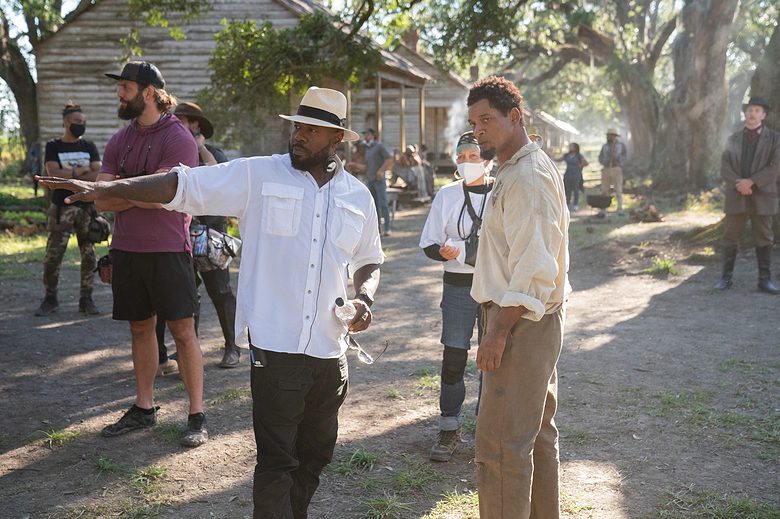 Based on a true story about a slave’s quest for freedom during the Civil War, Apple TV+’s oddly positioned Oscar contender Emancipation pairs action with an unflinching look at slavery’s brutality.
Based on a true story about a slave’s quest for freedom during the Civil War, Apple TV+’s oddly positioned Oscar contender Emancipation pairs action with an unflinching look at slavery’s brutality.
It stars Will Smith, whose bizarre post-Slap apology tour makes for strange bedfellows with Emancipation’s stark subject matter and the film’s action-oriented director, Antoine Fuqua. But this cautiously made movie is probably the best possible film this team could have produced. And indeed, it’s quite a bit better than an Oscar-ready slavery drama made in today’s Hollywood has any right to be.
Emancipation review: Antoine Fuqua’s best film
When we meet Peter (played by Will Smith), it’s 1863 and he’s being sold from one plantation to another, leaving his wife (Charmaine Bingwa) and kids (Imani Pullum, Jeremiah Friedlander, Jordyn McIntosh and Landon Chase Dubois) behind. Their Louisiana owner can’t afford to pay Confederate President Jefferson Davis’ new taxes, so he sells a host of his slaves.
Peter’s new home, in which he is put to work building a railroad, is a crueler place, with much more frequent beatings and brandings. However, he does not lose hope. He tells the rest of the people in chains that God is still with them, which offends everyone at first. How can God be anywhere near all this savagery and horror? Peter can only say that once you’ve seen God, you don’t stop seeing him.
One day while at toil, Peter overhears some of the overseers (Steven Ogg and Grant Harvey) talking about current events. These include that Union Gen. Ulysses S. Grant took Baton Rouge, Louisiana, and President Abraham Lincoln freed the slaves with his Emancipation Proclamation. This gets some gears turning in Peter’s head. And the news makes him more of a thorn in the side of the white overseers than ever. If not for the intervention of their boss, Fassel (Ben Foster), they would all have killed Peter a few times.
Peter runs for freedom
So Fassel is more excited than angry when one day, while digging graves, Peter notices the whites around him are fixing to kill him and throw him in with the other corpses. He beats them half to death and escapes. He runs and several other men — Tomas (Jabbar Lewis), John (Michael Luwoye) and Gordon (Gilbert Owuor) — bolt with him. Fassel catches Tomas and, before killing him, discovers that Peter’s plan was to make it to freedom in Baton Rouge.
With that information, even when the three survivors split up, the paddy rollers still know how to catch them. Fassel’s colleagues on this miserable task are the ignorant and mean Harrington (Ronnie Gene Blevins), and his Black companion Knowls (Aaron Moten). Despite catching runaways for a “living,” Knowls soon starts to look at his bosses sideways every day they’re out in the swamps without catching Peter and his compatriots.
If Peter’s going to make it to freedom, and to his family before his wife is forced to remarry someone else on the plantation, he will need to be cleverer than his pursuers while facing the elements, wild and vicious animals, hostile locals, his own injuries and hunger.
Emancipation pushes the limits of believability
To get the awkwardness out of the way first, Bill Collage‘s Emancipation screenplay makes Peter a hair too modern to be believable in the context of this film, which is loosely based on a true story. Peter’s indefatigable dignity when he’s introduced is inspiring, but also hard to swallow.
He starts the movie pushing slavers around on his way to the cart that will take him to the next plantation. It’s not exactly believable that you’d be allowed to shove people around and remain alive on a plantation in Louisiana, but the modernity is not much of a hurdle. Before long, the filmmakers have tempered that urge. Peter becomes a creature of instinct, outsmarting his pursuers through luck and skill alike.
Will Smith’s performance is mostly very good. And, though I imagine his Haitian accent will be a deal-breaker for some, I thought it worked. The whole cast proves excellent, from Ben Foster’s tall-talking but petty overseer, to the always-welcome Ronnie Gene Blevins‘ near-feral tracker, to David Denman and Paul Ben-Victor‘s dandy Union officers, and Mustafa Shakir‘s marvelous turn late in the film as Peter’s commanding officer during his brief stint as a soldier. I’ve made no secret of my admiration for Blevins before, and there’s no better way to ground a performance like Smith’s than to put him opposite actors capable of giving more invisible performances.
It’s extremely stupid that Emancipation emerges as the first movie after the non-crisis Smith created when he slapped Chris Rock at the Oscars. And Smith giving people permission on his PR tour to skip a movie about slavery because they might still have PTSD from what amounts to a televised bar fight is beyond satire. But eventually, the movie won’t be weighed down by this nonsense. It will simply exist.
A strange filmmaking pedigree

Photo: Apple TV+
Honestly, I’ll confess to walking into Emancipation looking for problems but came out pleasantly surprised that its failings were not with its realities but with its ambitions. The film wants to be both a kind of sprawling high-art fresco portraying social upheaval and the indomitable spirit.
But neither screenwriter Collage (whose baffling list of previous credits includes biblical epic Exodus: Gods and Kings, dystopian sci-fi flick Assassin’s Creed and the Mary-Kate and Ashley Olsen movie New York Minute) nor director Antoine Fuqua have the right chops for such a thing, nor much interest in actually achieving that aim.
Ordinarily, this would sink such a project. But oddly, it helps Emancipation. By mishandling its few attempts at pure artiness (shots of a flaming horse riding past an exhausted Smith, and the film’s aggressively desaturated look), it becomes much easier to appreciate the things Fuqua does right by staying true to his instincts as a scene constructor and action choreographer. Once Peter flees the plantation, the movie is basically just an account of his running from, and occasionally fighting, his captors, a contemporary riff on Cornel Wilde’s The Naked Prey.
Fuqua should be thought of as someone who can do this well, but he hasn’t made a really good action movie in … well, a very long time. Depending on what mood you catch me in, I’d say his last good one was his forgotten King Arthur movie from 2004 or 2001’s Training Day, which I like just fine but nowhere near as much as everybody else seems to. Since then, he’s been making abysmal Equalizer movies and mind-numbing dreck like Shooter and his 2016 remake of The Magnificent Seven.
The danger of modern heroes
I think maybe what’s been holding Fuqua back, if Emancipation’s successes are any indication, is that the concept of a modern hero is something he gratuitously overcommits to flattering. Mark Wahlberg’s ponytail-and-Ray-Ban cracker superman in Shooter, Denzel Washington’s ice-veined Home Depot serial killer in The Equalizer, Gerard Butler’s hungover and racist rogue secret serviceman in Olympus Has Fallen ... all of these guys are presented as cool and righteous.
No one’s definition of those two things is ever the same. So when Fuqua’s heroes walk in slow-mo toward the camera while rock music plays, you either roll your eyes or applaud. That’s quite a risk to run. And it goes some of the way toward explaining why I haven’t liked the last dozen or so of his fiction films.
Emancipation gives Peter a number of monologues and sequences that prove his mettle in ways that flirt with post-modernity, but still basically remain true to the historical record and vernacular. The film doesn’t get bogged down in stating Peter’s bonafides. The scars on his back, the torments he suffers, and the miles he crawls say that loud enough.
Slavery from a Black director’s perspective

Photo: Apple TV+
Fuqua isn’t the first Black director to make a movie about slavery or the Civil War killing fields. However, he’s probably the most famous and well-funded Black director to do so. The amazing and sadly too-little-known Charles Burnett’s Nightjohn and Nat Turner: A Troublesome Property and Sidney Poitier’s Buck and the Preacher come closest to precedent, and Steve McQueen’s 12 Years a Slave invented precedent when that film put him on the map in a way his previous art films hadn’t.
But in general, movies about this time in history are made by white men like Ed Zwick, Ronald F. Maxwell, and Quentin Tarantino, whose perspectives actively hamper their aims. White directors seemingly cannot help but valorize the actions and aims of white men when making movies about this period.
Fuqua didn’t seem like he was gearing up to make Emancipation, which is probably why it’s so good. He doesn’t treat the movie like it’s possessed of any more importance than the rest of his action movies. Its unemphatic procession of tense combat sequences, with occasional detours into the historical record (like the scene of Peter having his picture taken, probably the best scene in the film), connect to make an honest and brutal movie about this period in history — without insisting upon the film’s own importance. That’s something even an avowed anti-establishment provocateur like Tarantino couldn’t do.
Indeed, Emancipation is an extension of the infamous photograph of Peter that traveled the world as one of the strongest arguments against slavery and the people who were able to distance themselves from its charnel realities. Fuqua directs Emancipation like his aim is the same as the photographer’s. It is enough that you cannot deny the unspeakably gruesome acts Americans committed, and the herculean efforts of the enslaved to survive them, and how for all our efforts, we’re not so far removed from this period at all.
★★★★☆
Watch Emancipation on Apple TV+
After a Slap-related delay, Emancipation is now streaming on Apple TV+.
Rated: R
Watch on: Apple TV+
Scout Tafoya is a film and TV critic, director and creator of the long-running video essay series The Unloved for RogerEbert.com. He has written for The Village Voice, Film Comment, The Los Angeles Review of Books and Nylon Magazine. He is the author of Cinemaphagy: On the Psychedelic Classical Form of Tobe Hooper, the director of 25 feature films, and the director and editor of more than 300 video essays, which can be found at Patreon.com/honorszombie.
![Emancipation looks the horrors of slavery dead in the eye [Apple TV+ review] Emancipation review: This action-packed look at the brutality of slavery should make you forget The Slap.](https://www.cultofmac.com/wp-content/uploads/2022/12/Will-Smith-Emancipation-review-Apple-TV-1536x1005.jpeg)

